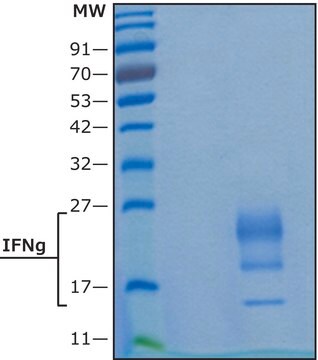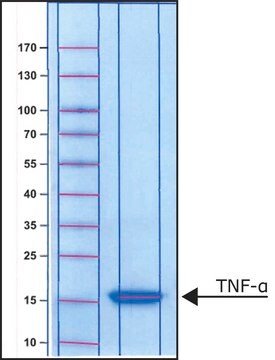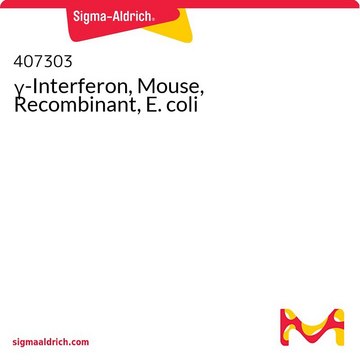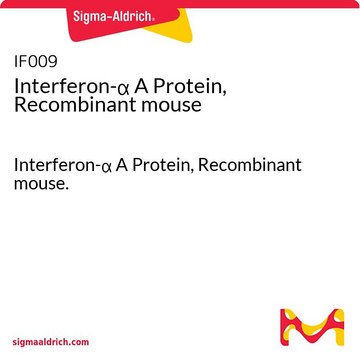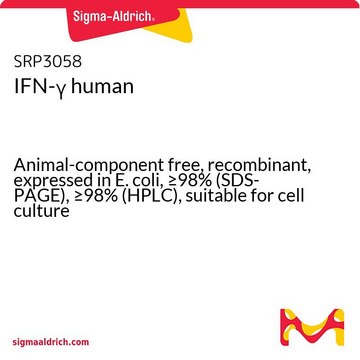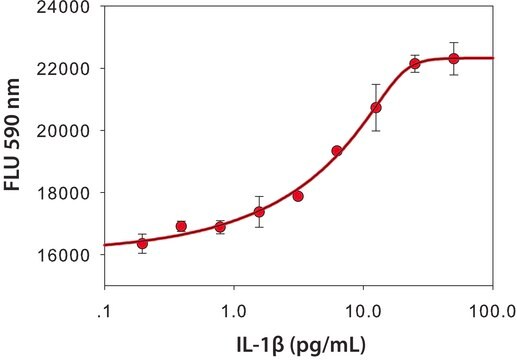IF005
Interferon-γ Protein, Recombinant mouse
The Interferon-gamma protein (or IFN-gamma protein) is a regulatory protein produced by activated NK cells & CD4+TCRalpha/beta+, CD8+TCRalpha/beta+ & TCRgamma/delta+ T cells.
동의어(들):
IFN γ, IFN g, IFN gamma, INF γ, INF g, INF gamma
로그인조직 및 계약 가격 보기
모든 사진(1)
About This Item
UNSPSC 코드:
12352202
eCl@ss:
32160405
NACRES:
NA.77
추천 제품
일반 설명
Interferon-gamma (IFN-gamma) is a regulatory protein produced by activated NK cells and CD4+TCRalpha/beta+, CD8+TCRalpha/beta+, and TCRgamma/delta+ T cells. The biological activities of IFN-gamma include the specific binding to a single class of high affinity receptors. In addition, IFN-gamma can upgrade the number of lymphoid cell functions including the antimicrobial and antitumor responses of macrophages, NK cells, and neutrophils. Recombinant Murine IFN-γ is a 134 amino-acid length protein with a predicted molecular weight of 15.6 kDa. C-terminal truncation due to proteolytic cleavage occurs during E. coli fermentation and results in a 15.1 kDa protein confirmed by mass spectroscopy. SDS-PAGE analysis of Recombinant Murine IFN-γ shows a band that migrates at approximately 11-12 kDa, under nonreducing and reducing conditions.
Product Source: Mouse, expressed in E.coli
애플리케이션
For most in vitro applications, IFN-gamma exerts its biological activity in the concentration range of 0.1 to 10.0 ng/mL.
생화학적/생리학적 작용
The ED50 as determined by a cytopathic effect inhibition assay with mouse NIH 3T3 cells challenged VSV is ≤ 0.1 ng/mL
물리적 형태
Sterile filtered, lyophilized from 10mM Sodium Phosphate, pH 7.0 + 25mM NaCl.
저장 및 안정성
The lyophilized protein is stable for a few weeks at room temperature, but is best stored at -20°C. After a quick spin, reconstitute with Sodium Phosphate, pH 8.0 to a concentration of 1 mg/mL. Further dilutions should be made into RPMI + 10% FCS or 5% HAS and stored at 2-8ºC for one week or -20ºC for future use. Reconstituted IFN-gamma should be stored in undiluted aliquots at -20°C for up to six months from date of receipt.
법적 정보
CHEMICON is a registered trademark of Merck KGaA, Darmstadt, Germany
면책조항
Unless otherwise stated in our catalog or other company documentation accompanying the product(s), our products are intended for research use only and are not to be used for any other purpose, which includes but is not limited to, unauthorized commercial uses, in vitro diagnostic uses, ex vivo or in vivo therapeutic uses or any type of consumption or application to humans or animals.
Storage Class Code
12 - Non Combustible Liquids
WGK
WGK 2
Flash Point (°F)
Not applicable
Flash Point (°C)
Not applicable
시험 성적서(COA)
제품의 로트/배치 번호를 입력하여 시험 성적서(COA)을 검색하십시오. 로트 및 배치 번호는 제품 라벨에 있는 ‘로트’ 또는 ‘배치’라는 용어 뒤에서 찾을 수 있습니다.
이미 열람한 고객
Peter Ohlschläger et al.
International journal of cancer, 125(1), 189-198 (2009-04-10)
Treatment of patients with cervical cancer by conventional methods (mainly surgery, but also radiotherapy and chemotherapy) results in a significant loss in quality of life. A therapeutic DNA vaccine directed to tumor-specific antigens of the human papilloma virus (HPV) could
Arun Balasubramaniam et al.
Scientific reports, 12(1), 22076-22076 (2022-12-22)
Enteric neuron degeneration has been observed during aging, and in individuals with metabolic dysfunction including obesity and diabetes. Honokiol, a naturally occurring compound, is an activator of Sirtuin-3 (SIRT3) that has antioxidant activity. Its role in modulating enteric neuron-specific neurodegeneration
Katrin Richter et al.
Frontiers in cellular neuroscience, 16, 779081-779081 (2022-04-19)
Activation of nicotinic acetylcholine receptors (nAChRs) expressed by innate immune cells can attenuate pro-inflammatory responses. Silent nAChR agonists, which down-modulate inflammation but have little or no ionotropic activity, are of outstanding clinical interest for the prevention and therapy of numerous
Jana Key et al.
Neurogenetics, 21(3), 187-203 (2020-04-29)
Human RNF213, which encodes the protein mysterin, is a known susceptibility gene for moyamoya disease (MMD), a cerebrovascular condition with occlusive lesions and compensatory angiogenesis. Mysterin mutations, together with exposure to environmental trigger factors, lead to an elevated stroke risk
Carmen D Rietdijk et al.
Cytotechnology, 68(6), 2379-2388 (2016-02-26)
The enteric nervous system (ENS) is a complex network of neurons in the gut, regulating many local, vital functions of the gastro-intestinal tract. The ENS is also part of the bidirectional gut-brain axis. The murine immorto fetal enteric neuronal (IM-FEN)
자사의 과학자팀은 생명 과학, 재료 과학, 화학 합성, 크로마토그래피, 분석 및 기타 많은 영역을 포함한 모든 과학 분야에 경험이 있습니다..
고객지원팀으로 연락바랍니다.

